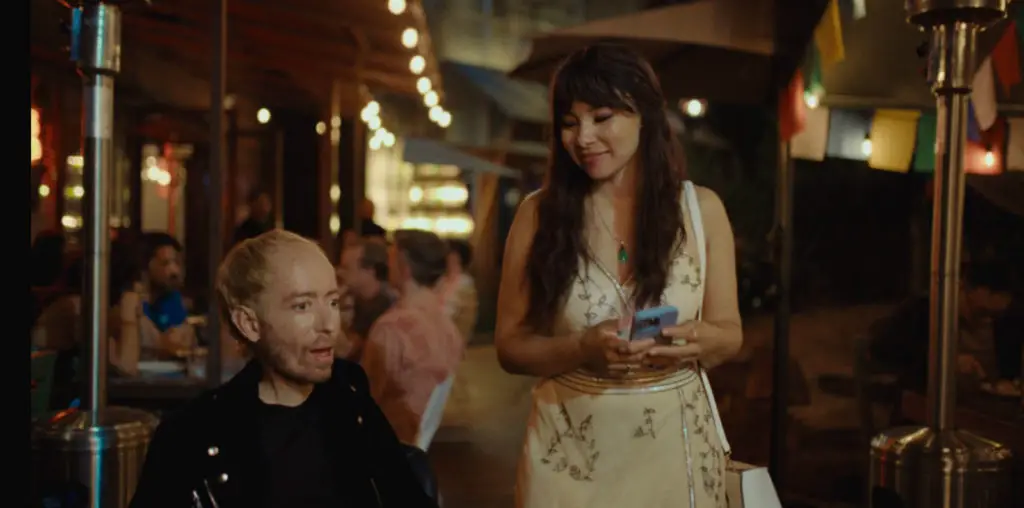
Jewish guilt runs deep in life, and especially during the approaching death of the patriarch of a well-to-do and decidedly estranged New York City family. Opening day-and-date on VOD, iTunes, and in theaters, “Lullaby” is a small, yet powerful indie film, probably shot on a very small budget, but with a big name cast: Garrett Hedlund, Richard Jenkins, Ann Archer, Jessica Brown Findlay, Anne Archer, Jessica Barden, Terrence Howard and Amy Adams.
Inspired by events within his own family, Andrew Levitas’ feature directorial debut transforms his own script into a movie that wears its heart on its sleeve. Filmmaking is a difficult art form to master, and it is to his merit that Levitas, well known in the art world for his Metalwork Photography photographic sculptures and his organic paintings, can mold the digital media to fine effect. While no stranger to the film/video/digital creative process, whether as an actor or, more recently, dabbling as a producer (including 2012’s “At Any Price,” revolving around the emotional scars suffered by a family of dairy farmers), Levitas has latched on to a somber, humanist cause—the right to die with dignity.
In the days before Passover, the financially successful Robert (Jenkins) is (finally) dying of the Big C. Although diagnosed a dozen years earlier, he’s now ready to pull the plug and he’s given his two kids a day or so to gather about before he turns off his life support. Jonathan (Hedlund) is his 26-year-old, chain-smoking, not-so-prodigal son, who removed himself from family matters and opted out of college life a half-dozen years earlier. He favored a music career in a galaxy far, far away (i.e., Los Angeles, the other planet). We see him first, breaking the rules (he’s good at that) by smoking on the cross-country flight back home. He may be busted, but he’s got a roguish charm and sympathetic manner that makes him likable, despite his greasy, unkempt appearance. Younger daughter Karen (Brown Findlay, “Downton Abbey’s” Lady Sybil) is an attorney unconvinced that dad is of sound mind—her brother knows otherwise—even if his body is wasting away. She takes pro-active measures to prevent his self-inflicted demise. Distraught wife Rachel (Archer), struggling to keep everything under control, is so tired she can’t remember the last time she slept at home.
While Amy Adams gives decent gravitas as Jonathan’s former g.f. in her brief time on-screen (likewise the under-used Terrence Howard), it is Jessica Barden (“Hanna,” “Tamara Drewe”) who gives the most memorable performance of her young life, as 17-year-old Meredith, a bone marrow cancer patient with a bowling ball head. She plays a good-natured, streetwise shrink who offers up a cool life attitude that helps Jonathan deal with his family’s situation. Minutes after she meets Jonathan in a hospital stairway, she’s bumming a cigarette from him, who questions if she’s old enough to smoke. She’s got a great natural delivery as she offers one of the film’s finer lines, “Am I old enough to die?” One of the more light-hearted moments is when Jonathan takes Meredith to a makeshift prom in the children’s ward.
A sassy nurse (Jennifer Hudson) offers moments that get the family in a rare, communal laughing mood, and maybe there is some emotional mending ahead. But moments of frivolity often slip, quickly, into darker mood swings as memories erupt (whether in conversation or flashback) and revelations are divulged, especially about the family’s finances.
Director of Photography Florian Ballhaus keeps his hand-held camera close to the family, sometimes favoring high angle shots. Editing (by Julie Monroe) is straight-forward so as not to offer any distractions. The minimalist score (when used) by Patrick Leonard is quite effective. The film, longish at two hours, does tend to stray, although scenes of a hastily-organized seder the family celebrates in the hospital’s deserted chapel are mostly off-ceremony and on-conversation. In its aftermath, in which Robert offers his daughter a one-shot attempt to literally argue her case, she pulls an all-nighter preparing a brief, interrupted by an occasional alcoholic distraction from her brother. Karen’s delivery—like a lawyer in court—feels awkward, even though the director fully intends the brother and sister to represent the prosecution and the defense.
If you didn’t get your fill of cancer in “The Fault in Our Stars,” here’s another dose, this one for the families dealing with an aging parent. Another death, another day, another cathartic movie. “Lullaby” makes an emotional, powerful statement about Life, and how one family deals with its end.

Review written by Elias Savada.